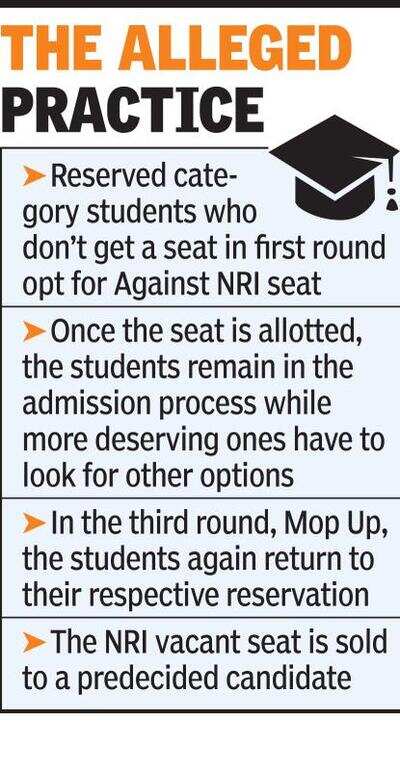
Nagpur: Allotment of seats under the Against Non-Resident Indian (NRI) quota after the second round of the ongoing centralized admission process (CAP) for MBBS and BDS courses has not only unearthed several alleged ‘dummy’ candidates but has also raised a big question on financial backwardness of aspirants claiming social reservations.
A random scrutiny of the NEET-UG CAP list has thrown up names of 60 such aspirants who applied under economically weaker section (EWS), Socially and Economically Backward Class (SEBC), Other Backward Class (OBC) etc reservation categories in the CAP first round, only to switch over to Against NRI category in the second round. This also allows the reserved category students, who fail to find a seat, to stay in the admission process till the end.
A MBBS or BDS NRI seat is five times costlier than other category seats while 15% of the total intake of all colleges is reserved under this category. This year, collective intake of all government medical colleges has gone up to 4,080 seats. This means around 812 NRI seats are available.
When there is no NRI applicant, vacant seats are offered to other candidates as Against NRI, provided they are ready to pay the fee and prove blood relation with the sponsor.
The limited rights of the State Common Entrance Test (CET) cell — which is conducting the medical admissions — to stop any candidate from making a particular choice or verify authenticity of such applicants is reportedly boosting the alleged malpractice.
As per officials, the Against NRI are blocked by these dummy candidates who later opt for vacant seats in the Mop-up round. When candidates with higher percentile give up admission hopes here, these seats are vacated and sold to an already decided candidate. In some cases, seats are blocked to divert students to private or deemed universities, they said.
CET cell commissioner Anand Rayate said, “We can’t stop anyone from applying under a particular category. For NRI students, there is a huge checklist from I-T returns to visa details while Against NRI seats, candidate has to only show from where he will pay the fee.”
Asked what action CET can take, Rayate said, “If someone has objection, we are ready to provide details and take appropriate steps.”
‘Save Merit’ activist Krishna Buty said he has written to Directorate of Medical Education and Research (DMER), medical education secretary, and CET regarding this trend of economically backward candidates changing category in subsequent rounds. “My investigation is on and if fraudulent practices come to fore I am ready to approach court of law,” he said.
Buty, who is one of the petitioners seeking additional open seats for MBBS, said it defies logic and transparency if an economically backward candidate suddenly agrees to pay five times higher fee than the regular amount.
The alleged practice
* Reserved category students who don’t get a seat in first round opt for Against NRI seat
* Once the seat is allotted, the students remains in the admission process while more deserving ones have to look for other options
* In the third round, Mop Up, the students again return to their respective reservation
*The NRI vacant seat is sold to a predecided candidate
A random scrutiny of the NEET-UG CAP list has thrown up names of 60 such aspirants who applied under economically weaker section (EWS), Socially and Economically Backward Class (SEBC), Other Backward Class (OBC) etc reservation categories in the CAP first round, only to switch over to Against NRI category in the second round. This also allows the reserved category students, who fail to find a seat, to stay in the admission process till the end.
A MBBS or BDS NRI seat is five times costlier than other category seats while 15% of the total intake of all colleges is reserved under this category. This year, collective intake of all government medical colleges has gone up to 4,080 seats. This means around 812 NRI seats are available.
When there is no NRI applicant, vacant seats are offered to other candidates as Against NRI, provided they are ready to pay the fee and prove blood relation with the sponsor.
The limited rights of the State Common Entrance Test (CET) cell — which is conducting the medical admissions — to stop any candidate from making a particular choice or verify authenticity of such applicants is reportedly boosting the alleged malpractice.
As per officials, the Against NRI are blocked by these dummy candidates who later opt for vacant seats in the Mop-up round. When candidates with higher percentile give up admission hopes here, these seats are vacated and sold to an already decided candidate. In some cases, seats are blocked to divert students to private or deemed universities, they said.
CET cell commissioner Anand Rayate said, “We can’t stop anyone from applying under a particular category. For NRI students, there is a huge checklist from I-T returns to visa details while Against NRI seats, candidate has to only show from where he will pay the fee.”
Asked what action CET can take, Rayate said, “If someone has objection, we are ready to provide details and take appropriate steps.”
‘Save Merit’ activist Krishna Buty said he has written to Directorate of Medical Education and Research (DMER), medical education secretary, and CET regarding this trend of economically backward candidates changing category in subsequent rounds. “My investigation is on and if fraudulent practices come to fore I am ready to approach court of law,” he said.
Buty, who is one of the petitioners seeking additional open seats for MBBS, said it defies logic and transparency if an economically backward candidate suddenly agrees to pay five times higher fee than the regular amount.
The alleged practice
* Reserved category students who don’t get a seat in first round opt for Against NRI seat
* Once the seat is allotted, the students remains in the admission process while more deserving ones have to look for other options
* In the third round, Mop Up, the students again return to their respective reservation
*The NRI vacant seat is sold to a predecided candidate
Trending Topics
LATEST VIDEOS
More from TOI
Navbharat Times
Featured Today in Travel
Quick Links
Lok Sabha Election Schedule 2019Lok Sabha Election NewsDelhi Capitals teamMI team 2019Rajasthan Royals 2019RCB team 2019Maharashtra Lok Sabha ConstituenciesBJP Candidate ListBJP List 2019 TamilnaduShiv Sena List 2019AP BJP List 2019Mamata BanerjeeBJP List 2019 MaharashtraPriyanka GandhiBJP List 2019 KarnatakaAMMK Candidate List 2019BJP List 2019 WBLok Sabha Elections in Tamil NaduBSP List 2019 UPNews in TamilLok Sabha Poll 2019Satta Matka 2018PM ModiMahagathbandhanNagpur BJP Candidate ListChandrababu NaiduTamil Nadu ElectionsUrmila MatondkarNews in TeluguMadras High CourtTejashwi YadavArvind KejriwalTejasvi SuryaPawan KalyanArvind KejriwalYogi AdityanathJaya PradaSatta King 2019Srinagar encounter
Get the app







